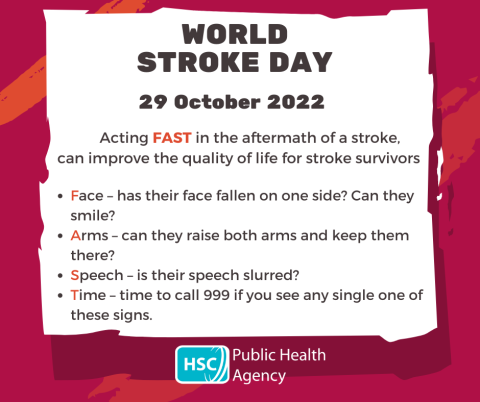Think FAST: World Stroke Day 2022

Ahead of World Stroke Day (29 October) the Public Health Agency (PHA) is urging people to think ‘FAST’ if they see someone having a stroke because the quicker you act the better the outcomes can be.
Stroke is a common cause of death and disability in Northern Ireland with approximately 2,800 new strokes here every year. While the majority of strokes occur in people over the age of 65, it can strike at any age, with 25% occurring in people under the age of 65.
Dr Brid Farrell, Deputy Director of Public Health at the PHA, said: “This World Stroke Day we want to raise awareness of the main signs and symptoms of stroke and what to do if you think you or someone you know is having a stroke because early diagnosis helps improve the chances of a good recovery.
“The theme of this year’s World Stroke Day focuses on saving Precious Time, referring to the need to act FAST in the aftermath of a stroke, as well as how that action can improve the quality of life for stroke survivors.”
The ‘FAST’ campaign highlights the key signs and symptoms of stroke in an easy to remember way and emphasises the need to call 999 immediately if you notice any single one of these signs:
- Facial weakness: Can the person smile? Has their mouth or eye drooped?
- Arm weakness: Can the person raise both arms?
- Speech problems: Can the person speak clearly and understand what you say?
- Time to call 999: if you see any of these signs
Knowing the signs and symptoms and acting FAST can improve the chances of survival and reduce the level of disability that results from a stroke. Even if symptoms are mild or don’t last, dial 999 immediately.
When somebody has a stroke, every second that goes by is crucial. The #PreciousTime campaign raises awareness about stroke symptoms and the importance of acting FAST. The faster you act the more of the person you can save.
Dr Brid Farrell advised: “Stroke is a ‘brain attack’, which happens when the blood supply to part of the brain is cut off and brain cells are damaged or die. The sooner somebody who is having a stroke gets urgent medical attention, the better their chances of a good recovery.
“A stroke is a medical emergency requiring immediate medical attention, so recognising a stroke and calling 999 for an ambulance is crucial.”
Dr Ivan Wiggam, Interim Clinical lead with the NI Stroke Network has said: “World Stroke Day with its focus on knowing the signs of stroke and the importance of saving Precious Time, is a powerful reminder that we can make a life-changing difference by recognising stroke and acting immediately. Stroke treatments, aimed at opening blocked blood vessels, are most effective if delivered early after stroke onset, before irreversible damage has occurred. ‘Time is Brain’ – knowing the signs and symptoms and acting FAST can greatly improve the chances of making a good recovery after stroke.”
It is important to remember that you can reduce your risk of having a stroke by:
- knowing and managing your personal risk factors for stroke such as high blood pressure, irregular heartbeat (eg atrial fibrillation), diabetes and high blood cholesterol
- stopping smoking
- exercising regularly
- maintaining a healthy weight;
reducing alcohol consumption;
For further information visit: www.pha.site/ActFAST
World Stroke Day is held on 29 October each year. The annual event was started in 2006 by World Stroke Organisation who declared stroke a public health emergency in 2010. World Stroke Day is an opportunity to raise awareness of the serious nature and high rates of stroke, talk about prevention and treatment, and ensure better care and support for survivors. More at www.world-stroke.org
